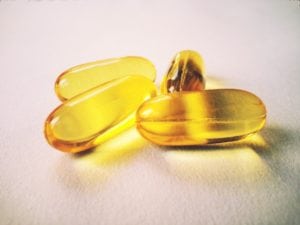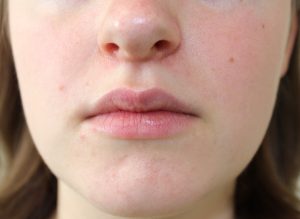 Omega-3 fatty acids are essential fatty acids responsible for forming certain receptors in our cell membranes. They help us to make hormones that assist in blood clotting, contract and relax our arteries, and regulate inflammation. They may help control eczema, rheumatoid arthritis, and lupus, and may even protect against cancer and other conditions.
Omega-3 fatty acids are essential fatty acids responsible for forming certain receptors in our cell membranes. They help us to make hormones that assist in blood clotting, contract and relax our arteries, and regulate inflammation. They may help control eczema, rheumatoid arthritis, and lupus, and may even protect against cancer and other conditions.
Additionally, omega-3 fatty acids protect against heart disease. Studies show that omega-3s can help to regulate heart rhythms and decrease the incidence of arrhythmias.
We at GHT commonly recommend omega-3s and fish oils for building immune systems, helping with eczema and skin disorders, and decreasing certain gut issues, particularly inflammatory issues related to the gut. We also recommend omega-3s and fish oils for pregnant and breastfeeding moms. This will help boost your baby’s immune system and brain development.
Brain Health
Perhaps most notably, omega-3 fatty acids are important for developing brains. Children should get enough omega-3s to help their brains grow during their developmental years. In fact, research shows that children taking daily supplements of omega-3 fatty acids could improve their literacy. That is to say, daily omega-3 supplements wouldn’t be magic pills that accelerate your child to genius literacy. However, omega-3s could make a difference in making the neural connections necessary for reading.
Three Main Omega-3 Fatty Acids
Eicosapentaenoic Acid (EPA) and Docosahexaenoic Acid (DHA)
EPAs and DHAs come from fish and are marine omega-3s. While EPA and DHA are useful, certain functions as omega-3s are limited. However, research shows that EPA and DHA may protect against prostate cancer.
DHA is particularly important for developing babies’ brains from the third trimester in utero to age two. Pregnant and nursing mothers should be sure to get enough omega-3s. If you are avoiding fish, make sure to find an alternative source. Some supplements contain non-fish sources of EPA, DHA, and ALA. The best sources of EPA and DHA are Atlantic salmon and Atlantic herring.
Alpha-linolenic acid (ALA)
The most common omega-3s are ALAs. ALAs are found in vegetable oil, nuts and seeds, leafy greens, and animal fat. The best sources of ALA are flaxseed oil and chia seeds. We generally use ALA for energy and brain development.
How We Get Omega-3 Fatty Acids
Omega 3s are not synthesized in our bodies, so we have to get them from the food we eat or from fish oils or supplements. They are naturally found in fish, vegetable oils, nuts (particularly walnuts), flaxseed and flaxseed oils, and leafy green veggies.
Fish are important sources of EPA and DHA, but it’s important to eat fish safely. Young children shouldn’t eat king mackerel, shark, swordfish, or tilefish due to potentially high levels of mercury.
Omega-3 Deficiency
Symptoms of omega-3 fatty acids deficiency
- Poor memory
- Fatigue
- Heart problems
- Dry, scaly skin
- Dermatitis
- Depression/mood swings
- Poor circulation
- Excessive dark, hard ear wax
It can be hard to include the right balance of vitamins your kids need through food alone. It’s always important to provide good, balanced meals for your little ones. However, some may consider a vitamin supplement if your child isn’t receiving their minimum RDA’s (Recommended Daily Allowances). Families who are vegetarian or vegan may need to rely on supplements for some of the vitamins found in meat and/or dairy. Additionally, if your child has poor eating habits, they may require supplements.
If you choose to provide nutrients in supplement form, it is still important to maintain good health. Also, always keep all medications, vitamins, and supplements out of reach of children.
Omega-3 Toxicity
Omega-3 toxicity may be detrimental to health. Research suggests that omega-3s in large quantities may have a negative effect on immunity.
It is possible to overdose on many vitamins and nutrients. Large quantities of some can be toxic. While over-the-counter supplements are usually safe, it’s important to make sure you or your kid aren’t overdosing on any vitamins. If you’re unsure about a vitamin or nutrient, consult your healthcare provider.
It is important to remember that diet supplements are not tested and regulated like prescription drug products. Problems with safety, contamination, and quality are common with these products, even if purchased from a reliable source. For more information on omega-3s, review our previous blog on the same topic.
There is no official recommended daily value of omega-3 fatty acids. However, the National Institutes of Health has developed a great chart for your reference.
Adequate Intakes (AIs) for Omega-3s
Babies from birth to 12 months should be receiving 0.5g of total omega-3s daily, including EPA, DHA, and ALA. Children ages 1 -3 should receive 0.7g and ages 4-8 years should receive 0.9g of ALA daily. Males aged 9-13 years should receive 1.2g and females of the same age should receive 1.0g of ALA daily. Males aged 14+ years should receive 1.6g per day, and females aged 14+ years should receive 1.1g daily ALA. Pregnant mothers should consume 1.4g daily and lactating mothers should consume 1.3g daily of ALA.
For those interested in the minimum RDA (Recommended Dietary Allowances), refer to the National Institutes of Health Nutrient Recommendations.Omega-3 fatty acids are not on common RDA charts.
Finally, if you are unsure about your omega-3 levels, a lab test can identify if you or your child are deficient. If you choose to provide nutrients in the form of supplements, it is still important to maintain good health in other ways. As always, keep all supplements out of reach of children. Visit the Growing Healthy Together Fullscript page for a look at the vitamin and mineral supplements that we prefer.
For a more in-depth look at deficiency and toxicity, check back in on our Vitamins and Deficiencies blog series, including the following:
- Vitamin A
- B Vitamins
- Vitamin C
- Calcium and Vitamin D
- Vitamin E
- Iodine
- Iron
- Vitamin K
- Magnesium
- Omega-3 Fatty Acids
- Zinc
For parents trying to ease their kids into eating food, Spoonful One is a great product that helps protect your baby from developing food allergies. Finally, if you have questions or concerns, please respond to this blog or contact us.




